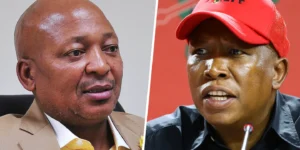By: Clyde Ramalaine
On occasion, Saul, the historical king of Old Testament Israel as the Biblical Writ leads, got himself in an entanglement of prophetic utterances, which necessitated the question: is Saul also among the prophets ? In a sense, hearing Mbeki on the ANC in his prophetic statement of an imminent split informed by irreconcilable ideological differences, one is tempted to ask naturally, is Thabo Mbeki also among the prophets on an ANC future? Absolutism defines the political theory that absolute power should be vested in one or more rulers. It also dictates government by an absolute ruler or authority: despotism. Yet it also advocates for a rule by absolute standards or principles. The French King Louis XIV 9 reigned 1643- 1715) has long been considered the best example of absolutism. Not only is Mbeki an absolutist but he also absolves himself of any of the factional context of the ANC when he stands central in such and can hardly be objective on such analysis.
I was hoping you could permit me to light my proverbial candle at the flame of Frantz Fanon. Fanon was explicit on the middle class when he asserted of them: “What I call middle-class society is any society that becomes rigidified in predetermined forms, forbidding all evolution, all gains, all progress, all discovery. I call middle-class society a closed society in which life has no taste, in which the air is tainted, in which ideas and men are corrupt. And I think that a man who takes a stand against this death is in a sense a revolutionary.”
As the night falls on what can be considered the second macabre of an NEC gathering a month apart, and the divide in the ANC is now pronounced in calls for a special conference, we hear voices. Voices that see splits predicated on an analysis of irreconcilable ideological differences. When we in 2021 sit with an ANC NEC that is wholly absorbed in factional interest essentially swayed if not intoxicated to let the factional identity stand for the sake of a CR22 second-term campaign, we hear questions from among others Thabo Mbeki et al. From the hinterland of factional antiquity, a voice rises less in the conviction of the error of the elites that hitherto has defined the ANC in leadership. An agent even less persuaded by the aggregate failure of the liberation cause as entrusted to consecutive ANC leadership, but instead in philosopher-king in jingoistic pride that decries the naked absolutist mind. Does Thabo M. Mbeki represent the sane, the meridian and the authentic? Or is he resorting in ease of comfort to kaftans of historical OR Tambo frames? I have elsewhere contended ANC leaders have hitherto failed to critically engage the leadership of its longest serving President Oliver Reginald Tambo. Whenever they refer to Tambo its in symbolism of perfection and never in objectivity od assisting the Movement to do better.
It is challenging to hear Mbeki and conclude that he presents the moral compass of ANC sanity. He is neither the neutral axis of an organisation that warrants an axis. Unfortunately, Mbeki does not remotely speak from the vestiges of ANC cadres that defines an ethos anchored in the persuasion of justice, but he is one of the architects of this factional identity that besets the ANC today in prominence of adulthood. Therefore, shall he be allowed to parade as a moral beacon and true north in this epoch because he, for some, defines a type of intellectualism that sets him apart. There are unfortunately those in the ANC who have long outsourced intellectualism to Thabo Mbeki and Joel Netshitenzhe in an uncritical sense, rendering them natural final authorities of what constitute sanity in the ANC. Unfortunately, history has no blank pages, any student of ANC history warrants liberating him/herself from the temptation of such sophism.
According to the Sunday Times, Mbeki warned the NEC meeting that the governing party should prepare for a possible split caused by irreconcilable ideological differences. Those who attended the NEC Mbeki said this in response to NEC member Tony Yengeni who said there are irreconcilable policy differences within the party. In the attempt to justify his analysis and stance of irreconcilable ideological differences, Mbeki cited the Oliver Tambo leadership experience with what became the gang of 8 members who opposed the ANC’s decision to open membership to whites, Indians and Coloureds. At first glance, one thought Mbeki was attempting to be the next Billy Gundelfinger, the famous divorce lawyer that serves wealthy elites. Mbeki also said: ” …we must just devote our attention to these major political issues which are about the life and death of the ANC and leave aside all the other matters.” It is difficult to appreciate this latter sentence because it is hearsay from a leaked audiotape. Again, this statement holds its own interpretation of the major political issues or life and death for the ANC. Furthermore, Mbeki is not clear what he implies with ‘leave aside all other matters.”
Mbeki’s question, “Do we still have an organisation called the ANC?” . This question protests being sincere and authentic as posed by a veteran, former National Office Bearer member privileged to have led as both deputy and ultimately president. However, while purportedly on the surface level one would give Mbeki credit for posing the question, the nucleus of the question is perhaps more deceptive in deflection. It threatens probably the most authentic reflection of the duplicity of the crime of obliterating the ANC that started not in 2008 as some conveniently want to contend. Beware those who ask what happened to the ANC because they ostensibly want to be seen as outside the problem when they are intrinsically part of the problem.
This ill-regard for an honest historical reflection where some arrogate a right to adjudicate the ANC in natural absolving of their complicit roles both past, recent past and present are what is wrong with the ANC. When the ANC NEC entertains and endorses the naked hypocrisy of a convenient narrow interpretation of its resolutions and triumphalism can ex-communicate its elected SG, Ace Magashule while turning a blind eye to the reality that all NOB members are implicated in a slew of allegations, it must be the most apparent evidence that the organisation is in trouble. What renders it more cumbersome is the fact that such NEC meeting [ this weekend like the one of April 2021] includes elders that fail to speak truth to power but are hellbent to instead score petty victories over past and new nemesis; we know as an organisation that has reached rock-bottom.
Mbeki should not be allowed to be the purported prophetic witness of a split in 2021 when he was the primary reason for COPE’s existence, except that it remained a party with surrogate mothers Mosiuwa Lekota and Mbhazima Shilowa until the true parent never claimed his COPE child.
Mbeki’s prophecies about an imminent ANC split is further borne out not by an authentic forewarning of a true veteran but instead in glaring confirmation of one who ages ago pontificated for a small ANC in which he on several occasions instead of engaging differing tripartite-leaders on ideological differences opted to tell the SACP and COSATU to go it alone. Is it this ANC Mbeki bemoans?
While it is comfortably accepted that Mandela expelled Bantu Holomisa, we cannot deny the role of and fingerprints of Mbeki in such historical action, perhaps the earliest confirmation of the mindset of a leader who essentially believes in expelling fellow ANC leaders when there are what he deems irreconcilable ideological differences. Hearing today, Mbeki anticipating a split is less in careful analysis but ostensibly him hoping for it. A smaller ANC is and remains his idea of an appropriate organisation. This not far-fetched for a man who has always believed a small membership ANC is better for his agenda of what the ANC should be.
Mbeki’s apparent wisdom today to see splits, therefore, has little to with a concerned veteran but a arguably the nexus of a factional mind who practised the politics of factionalism from before 2005. Just as he refused to own up to the proverbial child COPE produced in his name and around his personality, he equally so today refuses to own up to the demon of factionalism which has him present in the original laboratory when it was as a virus produced and tested in 2007 [reference to meetings close associates of Mbeki had to form COPE if they would lose a third term at Polokwane]. Is there any record of Mbeki publicly rebuking those who made up part of this callous and treacherous plot? Where has Mbeki ever reprimanded the surrogate COPE leaders back then?
Mbeki’s flawed prism of the ANC does not place any burden of blame on the corrosive and corrupt influence capital had on the ANC. If he ever has to attempt such an analysis in public space, he would be confronted to answer the nature, origin and subsequent wealth of his spouse, his SAFIKA boys and those who directly benefitted from proximity to his ANC and SA presidencies.
Earlier this year, Thabo Mbeki was part of a meeting in Stellenbosch where he, among others were categorically told by those who claim an Afrikaner identity that the ANC was given 30 years and is wholly incapable of running SA. Afrikaners boasted that it had created four privately trained security officers for every one police officers, meaning a parallel-state in security is long the order of the day in SA. Mbeki heard the arrogance and power of white monopoly capital telling him, and others present how Afrikaners got their proverbial second wind back and do not need to be politically elected to run this country. One would have thought these would be questions that keep a veteran awake when he was central in the first 20+ years of ANC leadership.
I am afraid Mbeki cannot objectively engage ANC challenges because he stands central in that challenge, suspended as the signpost of that factionalism. His politics of factionalism saw him in his Foundation agreeing with Motlanthe and De Klerk to engage a post-Zuma era. How did the one today shouting caution think his actions in this regard would assist unity and not entrench factionalism. Mbeki does not contend, for example, a fellow veteran Carl Niehaus in the latter’s written contextualisation of a call for Radical Economic Transformation an adopted resolution of the ANC’s 54th Conference. In a break with ANC tradition of engaging written texts that constitute discussion papers, Mbeki instead yield to temptation to become personal and arrogates a right to see Niehaus as leading a war-room without engaging the content. This now impoverished and historical leadership cannot engage anymore because one has reached a place where one sees oneself as the final authority in a movement many others like one joined voluntary.
If we still have an ANC, his question is a complex and necessarily ambivalent one for the many subtitles, and dualistic messaging it inherently conveys. In a sense, Mbeki comes as a surgeon dressed in his white dustcoat to perform an autopsy on what he was part of shaping and also poisoning. On the other hand, he engages the ANC as a political scientist in a proverbial class setting of a lecture when he chooses not to identify in cardinal aspects of such historical reality in selective preference.
Yet the question posed by Mbeki commodifies the ANC as an entity – as something one can own as a possession. On another level, it affords some a right to know of an ANC that is not tangible in warm bodies and practical branch context but uniquely present in the aloofness of an NEC leadership. Is this not what is wrong with the ANC when leaders like Ramaphosa and Mantashe arrogate a right to threaten ANC members with Cabinet reshuffles if they choose to exercise their democratic right and conscience to disagree with leadership in voting with the opposition DA party in parliament? The idea of an ANC without people is a fallacy since it is the members of the ANC that defines the ANC, yet in the ANC, its leaders see the ANC as their prized possession; hence when Mantashe or Duarte speak, they naturally assume they represent the true ANC when they are unilaterally dismissive of others. Do we even have an ANC is also false, for it in vain sense seeks to manage history where some want to claim an ANC they knew and was part of that did not evidence the ideological contradictions?
What is unfolding in the ANC is the contest of the masses searching for economic redress and an elitist leadership wholly dry-cleaned by white-monopoly-capital. An elitist leadership is the financial buffer-zone and created bulwarks to maintain economic inequality, until SA attest the most unequal society in the Globe. The contest is about making the resolutions that matter count and not peripheral step-aside, cheap public relations gimmicks about reputational damage shows of factionalism. It is to demand that factions do not earn the right to be be choosey which of the batch of resolutions take precedence. If Mbeki is the elder and prophet he purports to be, why did he not foresee this when he as leader endorsed what I long ago dubbed the policy of ‘BEE cum BBBEEE pollution’ that made more apartheid and colonial beneficiaries wealthy? Why did it not register on his conscience that when ABC leaders from NOB’s to branch level become rich and the poor they represent remain in squalor, there will be at some stage a revolution? Why did Mbeki not analyse the precarious impact of capital does not engage the artificial identity impugned? Why did he not ask why an ANC president needed R1bn to become president and advocate this to be un-ANC? Why is he still silent on the sealing of records of the incumbent president?
When CR22 today can abuse the ANC NEC as a law unto itself for political gerrymandering and cheap victories, there is a need for proper elders to ask questions that cuts on both sides. Unfortunately, such elders do not exist in the ANC since veterans have become both judge and jury on their legacies in which they periodically are all part of the very factionalism they analyse.
So, Mbeki has every right to his opinion, but he is hardly the meridian or beacon of objectivity because he is the embodiment of that very abuse of the branches when he, in Fanonian lament on middle class politics, cannot see the need to be revolutionary in this epoch. Any honest question about the existence of the ANC as posed by any ANC leader cannot come without the precursor of self – introspection a personal acknowledgement of a complicit role and responsibility in what the ANC depicts.
Unfortunately, Mbeki’s prophecy and analysis are not honest because he is still trapped in his historical fight since his defeat in Polokwane. His support of Ramaphosa against Magashule cannot escape his own blindspot to connect Magashule back to Zuma, naturally the enemy, the peasant who defeated him the aristocrat. That connection cannot objectively engage the dualism and glaring contradictions in applying a step-aside resolution as upheld by an NEC that some claim is long bought by flowing capital. Mbeki does not ask how step-aside became the dominant resolution for this ANC leadership when Radical Economic Transformation is deliberately ignored. Mbeki will not ask because Mbeki and his family is the signpost of our collective economic freedom.

A Lifelong Social Justice Activist Political Commentator & Writer is a SARChi D. Litt.et. Phil candidate in Political Science with the University of Johannesburg. Chairperson of TMoSA Foundation – The Thinking Masses of SA






